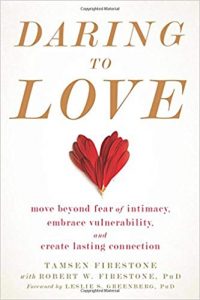The Act of Loving
 It’s so easy to overlook the fact that love is more than a feeling, it is an action. Love isn’t just a noun; it’s a verb!
It’s so easy to overlook the fact that love is more than a feeling, it is an action. Love isn’t just a noun; it’s a verb!
The act of loving is more gratifying for both the lover and the beloved than the state of being in love. That state is passive. It easily dissolves into an internal fantasy about being in love, a fantasy bond. The act of loving involves various types of real behavior that will keep a close relationship alive and vital, such as offering emotional and physical acts of affection; expressing tenderness, compassion, and sensitivity to your partner’s needs; sharing activities and interests; maintaining honest exchanges of personal thoughts and feelings.
We often make the mistake of regarding love as an instinct or an innate ability. We expect that loving should be second nature, like breathing. But like any other action, love is a skill that can be learned and developed.
There are three simple steps that make up the act of loving:
- Acknowledging and accepting your partner’s loving actions
- Being grateful and expressing your gratitude
- Giving back with actions of your own
Acknowledging and Accepting Your Partner’s Loving Actions
The first step is to recognize and accept the loving actions coming from your partner. This is much more difficult than it sounds because most of us lack full awareness of what is given to us. We tend to see our partner in terms of what we want from him or her or what we should be getting from him or her.
To gain perspective, step back from your partner. As you stand apart, get a feeling for yourself as a separate, independent person, perfectly capable of functioning on your own. The world doesn’t owe you anything; and, in spite of life’s disappointments and frustrations, you are a victim of no one. You are just you, alone. Now take a look at your partner, apart from you. Separate from anything you may expect, want, or demand from your partner. Separate from any role your partner may be fulfilling in relation to you. Like you, your partner is a person, alone.
Once you are able to experience yourself and your partner from this vantage point—seeing the two of you as two discrete individuals— look at what your partner is giving you. Don’t look for grandiose gestures of love and devotion. Don’t look for what you think your partner ought to be doing for you. Look for real, everyday acts of thoughtfulness, sensitivity, and kindness. Look for unique acts of giving that are an expression of your partner’s nature and sensitivity to your nature. Partners hurt each other by overlooking simple acts of love. However, when you acknowledge your partner’s acts of love, you accept the love your partner is offering to you.
Being Grateful and Expressing Your Gratitude
Once you have acknowledged and accepted what your partner is giving you, the next step is to be grateful and express your gratitude to your partner. But don’t rely on the occasional extravagant or effusive expression of gratitude. Instead, express your gratitude to your partner whenever you experience tender feelings of thankfulness because he or she has extended kindness, sensitivity, or generosity to you.
Giving Back with Actions of Your Own
Once you have acknowledged, accepted, felt gratitude, and expressed your gratitude for what your partner is giving you, the final step is to give back to your partner. But giving back to your partner is about being attuned to your partner as a person, separate from you and your relationship. Giving back to your partner involves, first of all, your awareness that you are two different people with your own individual traits, interests, and desires, and it’s this awareness that attunes you to what your partner personally wants and needs. Therefore, the final step is the act of responding to your partner’s personal needs with actions that are highly sensitive. Because this personal level of giving is such a profound expression of yourself, the more wholeheartedly you give back to your partner, the more fully you realize who you are. Expressing your love in this manner enriches both your lives.
Your critical inner voice will most likely try to sabotage your loving exchanges with your partner. It will influence you to overlook a loving gesture: He never demonstrates his love for you. I don’t see any signs of it. It will belittle your partner’s loving responses: You call that loving? It’s nothing. You deserve more than that. It will make fun of you when you acknowledge something your partner has given you: You are so pitiful! You’re practically groveling. It will ridicule the exchanges between you: You two lovebirds are so mushy, it nauseates me. I can practically hear the violins in the background. But when you ignore your critical inner voice and continue to be loving, the voice will weaken and fade, and you will triumph.
As we develop the ability to accept love with dignity and return love with appreciation, we find ourselves actively involved in being in love rather than losing each other by falling into a passive state of fantasizing about being in love.
Read more from Tamsen Firestone in Daring to Love: Move Beyond Fear of Intimacy, Embrace Vulnerability, and Create Lasting Connection
Tags: gratitude, intimacy, learning to love, love, relationship, relationship advice, valentine's day3 Comments
Comments are closed.










it is a great article.
For me love is like spirit, it needs to be giving from the heart to be felt, being a good partner means that you must express your feeling to the other, in our days we are fearful to be rejected or abandoned from the other if we let him or her know about our feeling, but it is not true we need to express and apply our gratitude and being thankful to the love of each other.
Before being in relationship you need to be sure that that person share the same value as you, the best way to find the best person is to start with friendship because you need to find who knows yours secrets, who protect you like a father, annoy you like a brother and love you like a mother cause he going to be all the world to you, you must choose your companion with wisdom to live a happy life
Amen 🙏
I believe that love is a verb. The act of live should be reciprocal l. I have expressed the face that I studied something that my husband truly enjoyed just to have a shared interest. We have a sexless marriage and we have our important conversations on the phone while he is at work. We spend our weekends in separate areas of the house and I decided to buy us both Valentines flowers because I really want some. We may talk about something every now and again but we can sit in the same room for hours and the only words we speak might be “excuse me if we belch or pass gas.